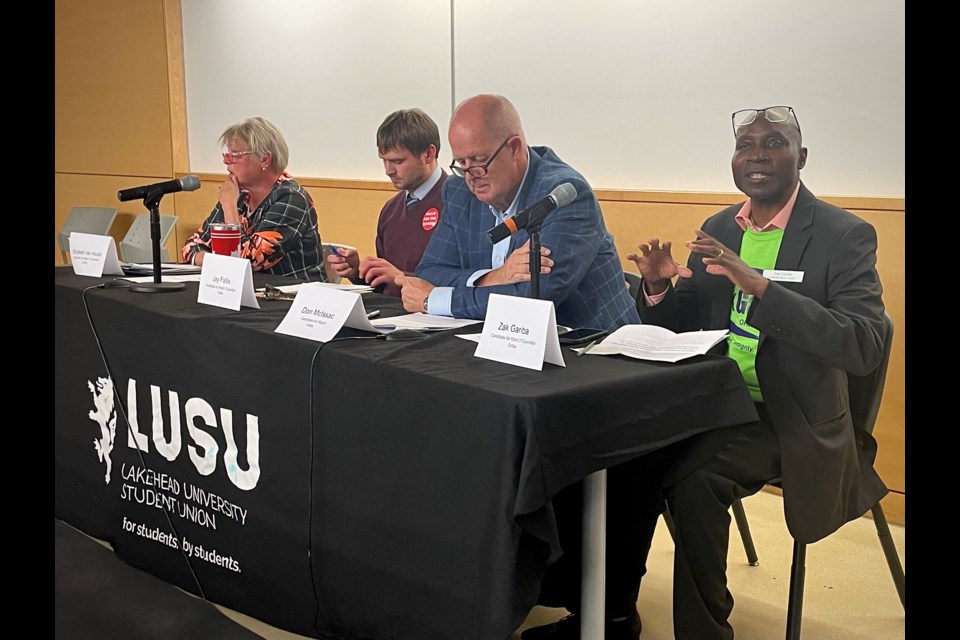Lakehead University hosted an Orillia municipal election forum on Monday evening, but less than half the eligible candidates participated in the event.
Set up for mayoral candidates, Ward 3 candidates, and school board trustee candidates, Rock the Vote saw hopefuls discuss affordable housing, food insecurity, bringing good job opportunities to the city, accommodating regional growth in Simcoe County schools, and more.
Co-hosted by political science professor Todd Stubbs and student Aaron Hiltz, dozens of community members attended to hear from the council and trustee hopefuls.
The only mayoral candidate to participate in the event was Don McIsaac. Neither Mason Ainsworth nor John Maxwell showed up.
Jay Fallis, Zak Gariba, and Elizabeth Van Houtte participated, but the three remaining Ward 3 candidates did not. At least two, however, showed up to watch the event and chat with attendees afterwards.
Among the school board candidates, both Meghan Dunlop and Jodi Lloyd participated in their bid for the Simcoe County District School Board trustee position, but candidates for the other school boards did not attend.
Invites were sent on Sep. 23, and candidates were given until Oct. 7 to book a spot at the debate table, said Lakehead officials.
Reminders were sent to candidates to reserve a place, and several did reach out after the deadline, organizers said, but only those who responded in time were allowed to participate.
The rest of the candidates, however, were still invited to join the crowd.
The forum was divided into two separate question-and-answer sessions for council and school board trustee candidates, who were each posed five questions, with questions from the public taken by all candidates afterwards.
One question from the public asked candidates to explain what they could do to bring good jobs to the area.
Seemingly directed at council candidates, both Dunlop and Lloyd weighed in from an educational perspective, as well.
Though Dunlop is a social worker, she comes from a family that has worked in plumbing for three generations.
“Thinking about students in schools, one thing that comes to mind is the trades. There was a lot of stigma around students going into the trades when I was younger, and even when my parents were in high school,” she said. “I have grown up seeing the importance of the trades … if we can really work to decrease that stigma, and get folks into the trades.”
Lloyd argued students need to be made aware of where the job market is going as they look to start building careers upon graduation.
“It's critically important that we help them understand what the marketplace is, and what the marketplace is going to be,” she said. “There are jobs in Simcoe County right now, and there are jobs in Orillia. They’re in healthcare and … we have a critical labour shortage in education right now, so I think it's important that we also help young people understand where the jobs in the future are, and help them plan their pathways to those jobs.”
Candidates provided a wide array of answers when a member of the public asked how they would strengthen local democracy and increase public participation in local politics.
Van Houtte highlighted the importance of transparency and “bringing community together.”
“I will reiterate the importance of bringing community together, the importance of bringing people with various backgrounds with desire, with the passion to make a change, and how do you do that?” she said. “Getting people together in the wards, collectively, and making transparent what's going on in council, and each of us taking it to our ward, to our community, and helping solve the problems.”
McIsaac highlighted following through on “basic stuff,” such as returning phone calls.
“It's simple stuff, you return phone calls. People reach out, they have questions, have issues, talk to them; return their phone calls; show up for meetings,” he said. “I mean, this isn't rocket science. It's basic stuff. It's common decency and we owe it to each other. We need everyone's voice heard, not just some – everyone's.”
Fallis, seeking his second term on council, said public engagement is something council can “improve on,” and said he hopes to host Ward 3 meetings every year.
“As a councillor I’ve hosted two ward meetings, and the goal next time around, if I’m re-elected, is to do one each year,” Fallis said, noting COVID-19 made public meetings difficult over the previous term.
He also suggested holding roundtable discussions with Lakehead University and Georgian College, and making information more accessible for residents.
“With our bylaws and legislation, it's often very complicated and the public's eyes just glaze over,” he said. I think it's our responsibility as council members, but also as a city to make it so that you can understand what's happening at the city council table… so that everyone can access the information they need. “
Gariba said he supports having town hall-style meetings, and that, for him, door-knocking season will not end with the municipal election.
“I'll come and knock at your door almost all the time, not after only four years,” he said. “I’d like to get your opinion on what's going on in your community, and then you have community involvement.”
Lloyd pointed to software the school board uses, such as ThoughtExchange, and student politics as ways to get both students and parents involved with the decision making process.
“Simcoe County is 4,800 square kilometres, and it's (almost) as big as Prince Edward Island – we have to get new and innovative ways to talk and communicate with our parents and our school communities, (and) we are continuing to do this because we've seen it being incredibly successful,” she said.
Dunlop said valuing student ideas and opinions would help increase political participation among youth.
“Students and young people have ideas; they have really good things that they value and have great opinions, so I think it's really important for the community to show the students that their voices matter,” she said.
